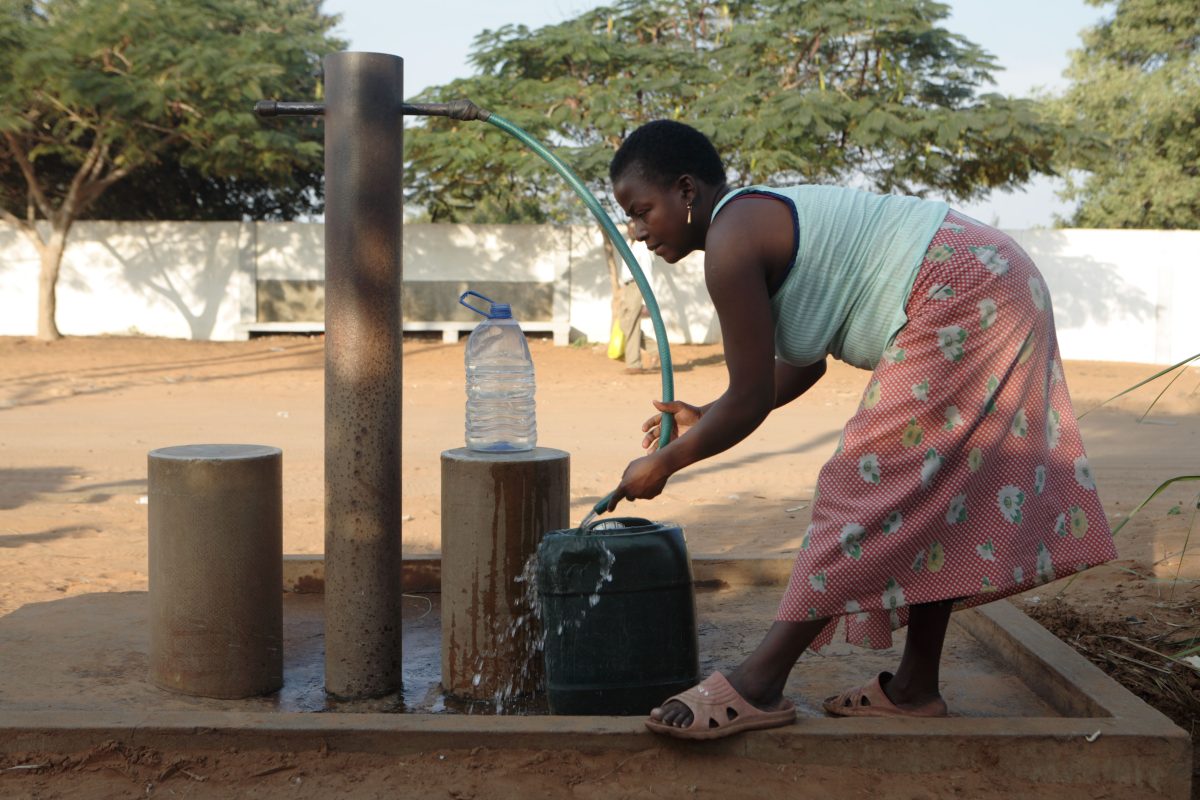Sustainable groundwater access can build resilience among Mozambicans
Posted in : Blog on 9 December 2020
Nearly 45% of the population in Southern Africa lives in extreme poverty. With 2.5% of the world’s population, the region accounts for 9% of extreme poverty globally. Unpredictable climatic conditions further exacerbate wellbeing and development. Groundwater can play a critical role in driving the growth of the region as it is a resilient yet under-utilized resource that is less vulnerable to the impacts of low and variable rainfall.
At least 70% of the Southern African Development Community (SADC) population relies on groundwater as their primary water source. This water is used for drinking and sanitation and supports livelihoods, agriculture, ecosystem, health, and industrial growth. If used sustainably, groundwater could provide potable water to the estimated 40% of SADC inhabitants that currently lack access to safe drinking water and sanitation services. It could also alleviate pressure on the region’s surface water and help communities endure dry spells.
The majority of groundwater in Southern Africa is stored in 30 vast transboundary aquifers. This means that a regional approach and shared understanding of groundwater dynamics is essential for its large-scale and sustained utilization.

The Southern African Development Community-Groundwater Management Institute (SADC-GMI), with support from Cooperation in International Waters in Africa (CIWA) Program and the Global Environment Facility (GEF), contributes toward the SDG 6: Clean Water and Sanitation for All by promoting the sustainable use of groundwater in the Southern Africa region.
“We consistently strive to demonstrate the invaluable role played by groundwater to build resilience through its sustainable use in the community’s livelihood and WASH activities. Our work goes beyond creating enabling frameworks for sustainable groundwater management initiatives to piloting innovative infrastructure projects necessary for communities to access the resource.”
Brighton Munyai – SADC-GMI Senior Groundwater Specialist.
Providing safe water supply in Mozambique
Supporting the Government of Mozambique’s endeavor to provide sustainable water supply by channelling groundwater sources, the World Bank is helping increase water production capacity through infrastructure development. The Water Services and Institutional Support (WASIS) Project in the cities of Tete, Moatize and Pemba, for example, will provide water to 200,000 people.
Many rural communities in Mozambique lack access to safe potable water, which negatively affects their health. According to the last population Census 2017, access to improved water in rural areas was as low as 35%, compared with 77% in urban areas. However, those living in peri-urban neighborhoods usually lack access. The peri-urban neighborhoods of Maputo and Matola, for example, are not fully covered by public water services and nearly 1.2 million people (around 40% of the population) are served by private water supply systems, which use groundwater.
To address this challenge, Mozambique has taken decisive steps to strengthen the water supply sector. It has created mechanisms to give voice to consumers and ensure the services better respond to user’s needs.
CIWA supports SADC-GMI’s broader program of providing groundwater supply to the remote areas of the country. One such water supply project is in Muchocolote, in the Matutuíne district of Maputo Province in southern Mozambique.
Despite slight delays due to COVID-19, the project helped provide water to approximately 2000 inhabitants by installing a solar-powered pump. This drastically reduced the distance that women and girls walk in search of water.
“We are grateful for this development. Earlier, I would come home after a long day at the field, tired and exhausted, and think of ways to get water as it was far away. Now our lives have become easier with close access to water for us and our animals.”
Linda Fazenda Sucane, Farmer
Through this project, people now have access to a sustainable and reliable water supply situated in preferred locations. Though Muchocolote is a remote village, it now attracts more people due to the availability of safe water. The local authorities have seen a rise in the demand for land, which will lead to a population increase in the future.
The benefits to the community are multi-fold –access to safe water will help reduce disease incidences which in turn will fuel household savings and increased productivity due to lower sick and childcare days will increase income. Women can use their time saved from collecting water in other productive activities. In the long-term, water availability can lower mortality rates and provide opportunities for starting new business initiatives.
CIWA promotes sustainable groundwater management in Africa
CIWA believes that sustainable groundwater management is one of the answers to resolve water-based challenges in Africa. Through its new Sahel Groundwater Initiative, CIWA will help strengthen foundations for enhanced groundwater knowledge and management capacity in the Western Sahel.
In another project, the Horn of Africa Groundwater Initiative (HoA-GWI), CIWA promotes regional cooperation on groundwater management and development in the Intergovernmental Authority on Development (IGAD) member states by strengthening knowledge systems, building national and regional capacities, and assessing the feasibility of specific investments.
The case of Muchocolote, like other important groundwater projects in SADC, can inspire governments to take concrete action towards harnessing groundwater resources to stimulate socio-economic growth and improve health in their countries.
Authors
James Sauramba, Executive Director, SADC-GMI
Anna Cestari, Senior Water Resources Management Specialist and World Bank Task Team Manager for the Sustainable Groundwater Management in SADC Member States project


